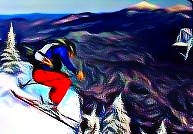Welcome back! Sorry for the long delay in weather related ramblings but I was busy taking the NY bar exam for fun. Why not right? What harm can being admitted to a third state cause? Anyway, I’m back and full of weather talk. So here we go.
As many of you have noticed it has rained quite a bit this summer. For those of you who were running with me on Sunday it rained on us enough to satisfy an entire month of water needs!
But how wet has it been?
The short answer- Historically wet!
For example, Albany, NY set a record with 9.91 inches of rain. The previous record of 9.37 inches was set in 1871! Albany also had average July temperature of 68.3 degrees which was the third coldest on record. BRRRR!
Of course the next question any true famous internet skier would ask is: what does that mean for winter? While the appropriate response is buy me some beer or show me a naked picture of your sister and I’ll tell you. However I’m too nice for that (and I already have pictures of your sister…woof.) Plus I’m bored at work. Therefore, I’ll just tell you.
Sticking with Albany, the other wettest Julys are:
1871, 1850, 1848, 1863, 2005, 2007, 1975 and 1970.
The other coolest Julys are:
1992, 2001, 1971, 1976, 1824, 1875, 1978, 1965 and 2001.
Interestingly, there is not ONE other year where there was a record cold July AND and record wet July. That’s part of what makes this July historic. It also has to factor into our interpretation of what this July means for the upcoming winter.
The Mt. Mansfield snow stake, showing total snow depth, for the above years shows:
The Wet Years:
The Cold Years
Looking at the snow stake data, it appears that having a cold July is more likely to lead to an above average depth on Mt. Mansfield. The effect of a wet July is hard to judge because there is simply not enough data to look at. Additionally, we can rule out 2007 and 2005 as good analogies because both those winters were not el nino winters, and this winter an el nino pattern will prevail.
One Comments
Leave a Reply
|
|||
| Home |






Greg
wrote on August 5th, 2009 at 8:36 amIt’s coming!! Thanks LH!